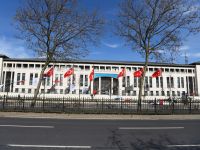Kenyan authorities announced Thursday evening that at least 70 students have been killed in an ongoing hostage crisis in northern Kenya's Garissa University College.
Internal Security Cabinet Secretary Joseph Nkaiserry and Kenya's police inspector-general said that over 500 students had been rescued from the attackers.
They have said that while four have been killed so far, an unknown number of gunmen are still in the building.
Militants stormed the campus in the early hours of Thursday, holding an unknown number of students hostage for nearly 14 hours.
"We have so far killed dozens in the university and the operation is still underway," Ali Dheere, a spokesman for Somalia's Al-Shabaab militant group, told the Andalus radio station and the "Somali memo" website earlier.
"We attacked the University in Garissa because we are at war with Kenya," he said.
The Al-Qaeda-linked group has vowed to carry out attacks in Kenya as long as the East African country keeps troops in Somalia.
In late 2013, Al-Shabaab gunmen stormed Nairobi's Westgate Mall, holding hundreds of people hostage.
The four-day saga left 67 people dead, including all of the hostage-takers.
Kenya Muslims give blood for campus attack victims
Hundreds of Muslim residents of Kenya's northern town of Garissa on Thursday donated blood to help victims of an attack on a university campus that remains ongoing.
"My heart goes out to all those who lost loved ones," Ahmed Isaack, who donated blood along with his wife, told The Anadolu Agency by phone.
"As Muslims, we pray for them," he said.
The university is located roughly 3km from the town of Garissa and less than 200km from the border with troubled Somalia.
As of early Thursday evening, the hostage-taking saga – responsibility for which has been claimed by Somalia's militant Al-Shabaab group – had gone on for nearly 12 hours.
"Let Al-Shabaab know that these attacks will not divide Kenyans, as they may have intended," said Isaack.
"Those behind this attack are not Muslims, but criminals," he insisted.
Al-Shabaab spokesman Ali Dheere said the group's operatives had entered the university at about 3am and separated Muslims from non-Muslims.
"We released only the Muslims," he told the Al-Shabaab-affiliated Andalus radio station and the "Somali memo" website.
Dheere said that Kenyan security forces had only learned of the attack after the Muslim students were freed.
Abdikadir Daud, a local mosque leader, said religious leaders had appealed – through mosques and radio stations — for volunteers to donate blood "to save our brothers and sisters."
The Kenya Red Cross issued an urgent appeal for blood donations following the attack, in which most of those injured sustained gunshot wounds.
The Health Ministry and the Kenya Red Cross have set up a tent next to a local hospital to take blood.
"We are here in solidarity with the victims," Daud told AA. "We are one. We are Kenyans."
He said leaders of the local Muslim and Somali communities had made their stance known.
"We have made this known to the county commissioner and police chief in Garrissa that cooperation with locals is crucial in community policing," noted Daud.
"My worry is that our community is always victimized after such attacks," he said.
The last security operation saw the Kenyan military burn down the town's main market and arrest hundreds of residents.
Less than 200km from the Somali border, Garissa has an estimated population of 623,000.
It is the largest town in Kenya's Somali region, formerly known as North Eastern Province.
Most of the local population is Muslim.
By Andrew Ross








